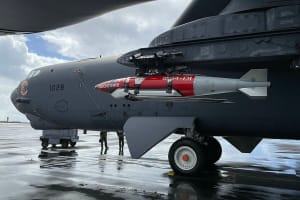Israeli soldiers find massive amounts of Russian-made weapons in Hezbollah hideouts in Lebanon – WSJ
Russia could play a key role to stop weapons transfers as part of Lebanon ceasefire

When Israeli soldiers began entering southern Lebanon as part of the IDF’s ground offensive, they encountered Hezbollah’s massive weapons stockpiles – most of them filled with advanced, recently produced Russian weapons, The Wall Street Journal (WSJ) reported.
According to an Israeli officer cited in the report, 60 to 70% of the weapons found in the initial days were Russian-made. Although this high percentage has since dropped, IDF soldiers continue to discover Russian weapons, including some of the most dangerous weapons Hezbollah has fielded against soldiers and civilians in Israel, such as the advanced Kornet anti-tank missiles, some of which were produced as recently as 2020.
The sheer volume and, in particular, the recent production dates of the weapons have surprised Israeli experts and IDF intelligence, who had long been aware that Hezbollah possessed significant quantities of older, including Soviet-era, weapon systems.
Around 60-70% of the Hezbollah weapons seized by the IDF during Israel's ground operation in southern Lebanon were made in Russia.
— Visegrád 24 (@visegrad24) November 20, 2024
H/t @TomasZdechovsky
🇮🇱🇱🇧🇷🇺 pic.twitter.com/Ovp3gWlVpN
However, it appears that many modern weapons were recently transferred to Hezbollah from Syrian stockpiles, according to Syrian security officials and an Arab official cited by the WSJ.
Russia has long been the Syrian army’s primary weapons supplier and has increased its military presence in the country in recent years, helping the regime suppress the uprising by armed Islamist groups to effectively win the Civil War, which still continues to simmer.
“Some in the West have continually hoped that Russia would restrain Syria, preventing the Damascus regime from becoming a wholesale subsidiary of Tehran. But those hopes were always exaggerated because Russia’s interests are similar to Iran’s and because Moscow is no less willing than Tehran to prop up a regime that has committed gruesome atrocities,” said David Adesnik, vice president of Research at the Foundation for Freedom of Democracies (FDD).
In the tunnels of "Hezbollah" was a stash of russian weapons, it was discovered by the IDF military, — Times of Israel
— Jürgen Nauditt 🇩🇪🇺🇦 (@jurgen_nauditt) October 2, 2024
During secret raids against Hezbollah bases in Lebanon, the Israeli military found MRO-A infantry rocket launchers and russian-made Konkurs ATGMs.
In… pic.twitter.com/FLfcULRJD2
“These latest weapons shipments are an apt illustration of the full convergence of Russian, Iranian, and Syrian interests in support of Hezbollah,” Adesnik added.
Russian weapon systems found in Lebanon include not just the modern Kornet, but also other guided anti-tank missiles like Metis, Konkors, Fagots and Saggers.
According to an Israeli officer cited by WSJ, the weapons were discovered within a kilometer of the Israeli border, apparently in preparation for Hezbollah’s long-held plans to invade the Israeli Galilee.
Some of the weapons exhibited markings indicating they were first transferred to Syria before being moved to Lebanon.
“It should be no surprise that Russian-origin weapons facilitated by the Assad regime have been found in Hezbollah’s arms caches,” said Behnam Ben Taleblu, senior director of FDD’s Iran Program.
“Hezbollah’s most sophisticated anti-ship cruise missile, for example, is not the Iranian copy of the C-802, which was fired at an Israeli vessel in 2006. Rather, it is the Yakhont/Oniks, a Russian supersonic anti-ship cruise missile that reportedly made its way into Hezbollah’s arsenal by way of Syria,” he explained.
“One goal of the Iranian axis has been to create a fluid relationship between each member so that Tehran is not the only party bolstering or bailing out others.”
Israel, in recent years, has attempted to continue its traditionally good relations with Russia, while the Kremlin increasingly cooperated with the Iranian regime and its allies.
According to media reports, Israeli Strategic Affairs Minister Ron Dermer recently visited Russia in an attempt to gain its assistance for a ceasefire with Hezbollah, possibly to convince the Kremlin to put a stop to weapons transfers to the terror group.
Foreign Minister Gideon Sa’ar recently said Israel hopes Russia will help enforce a potential agreement to disarm Hezbollah by preventing the smuggling of weapons.
“The Russians are present in Syria. If they agree with the principle, they can contribute to achieving this objective effectively.”
However, Deputy Foreign Minister Sharren Haskel recently proposed sending Russian-made weapons to Ukraine, a move that could potentially harm Russian-Israeli relations.
“I welcome the proposal and hope that the State of Israel approves it,” Ukrainian Ambassador Yevgen Korniychuk said.
“The weapons made in Russia, which are in the hands of the terrorist organizations, prove that Russia supports and encourages Iran, Hezbollah and Hamas and all those who aim to kill Israeli citizens and soldiers,” he added.

The All Israel News Staff is a team of journalists in Israel.














